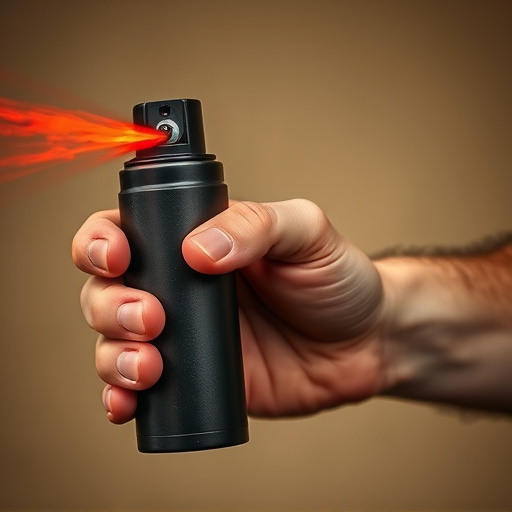Storing pepper spray at home requires careful consideration of safety, accessibility, and environmental conditions. Follow manufacturer instructions, store it securely out of reach, maintain proper ventilation, and keep it in a cool, dry place. Adhere to local laws and regulations regarding ownership and usage, which vary across regions. Regular maintenance and clear labeling prevent accidental use or exposure, ensuring your family's preparedness while respecting legal frameworks governing its responsible deployment.
Police often deploy pepper spray as a crowd control measure, but understanding its effectiveness and risks is crucial. This article delves into the topic of storing pepper spray at home, covering best practices for safety and legal considerations. Learn about responsible use guidelines to ensure you’re prepared while adhering to the law. Discover key aspects of storing pepper spray at home effectively, empowering you with vital knowledge in a potentially dangerous world.
- Understanding Pepper Spray: Its Effectiveness and Risks
- Storing Pepper Spray Safely at Home: Best Practices
- Legal Considerations and Responsible Use Guidelines
Understanding Pepper Spray: Its Effectiveness and Risks
Pepper spray, also known as oleoresin capsicum (OC) spray, is a popular crowd control agent used by law enforcement agencies worldwide. It’s designed to incapacitate individuals temporarily through irritant chemicals, allowing officers to gain control of potentially volatile situations. When deployed, pepper spray creates a burning sensation in the eyes, nose, and throat, leading to teary eyes, coughing, and difficulty breathing. This disorienting effect can last for several minutes, providing critical time for police to secure an area or subdue a suspect.
However, storing pepper spray at home comes with its own set of risks and considerations. While it’s useful for self-defense in certain situations, improper handling or storage can lead to accidental deployment or contamination. Users should always follow manufacturer instructions regarding storage, ensuring the container is kept tightly closed and stored away from heat, direct sunlight, and potential ignition sources. It’s crucial to be aware of local laws and regulations concerning pepper spray ownership and usage, as these vary significantly from place to place.
Storing Pepper Spray Safely at Home: Best Practices
When storing pepper spray at home, prioritize safety and accessibility. Keep it in a secure location, away from children and unauthorized individuals. A high shelf or locked cabinet is ideal to prevent accidental usage. Additionally, ensure the area is well-ventilated to avoid any potential buildup of spray residue. Use original packaging whenever possible for clear instructions and integrity of the product.
To maintain its effectiveness, store pepper spray in a cool, dry place, away from direct sunlight or extreme temperatures. Check expiration dates regularly, as pepper spray can lose potency over time. Keep it charged or ready for use by testing the device periodically. Regular maintenance ensures that you and your family are prepared in case of an emergency, utilizing the best practices for storing pepper spray at home.
Legal Considerations and Responsible Use Guidelines
The responsible use of pepper spray by law enforcement is governed by a complex web of legal considerations and guidelines designed to ensure public safety. Authorities must adhere to strict protocols when deploying this chemical agent, including proportionality, necessity, and the minimization of harm to both officers and civilians. The legal landscape surrounding pepper spray varies across jurisdictions, with differing laws dictating its classification, permissible uses, and storage requirements.
When it comes to storing pepper spray at home, there are specific guidelines to follow. It should be kept out of reach of children and stored in a secure, locked location. Proper labeling and clear instructions for handling and disposal are essential to prevent accidental use or exposure. Law enforcement agencies also have comprehensive policies regarding the distribution and retention of pepper spray, ensuring it is used appropriately and responsibly during operations.
In conclusion, while pepper spray can be a valuable tool for personal safety, proper storage at home is paramount to ensure its effectiveness and mitigate potential risks. Understanding the best practices for storing pepper spray, as outlined in this article, including keeping it out of reach of children and pets, choosing secure storage options, and adhering to legal guidelines, will help individuals make informed decisions about their self-defense arsenal. Remember, responsible use and safe storage go hand in hand when it comes to leveraging the power of pepper spray for protection.
